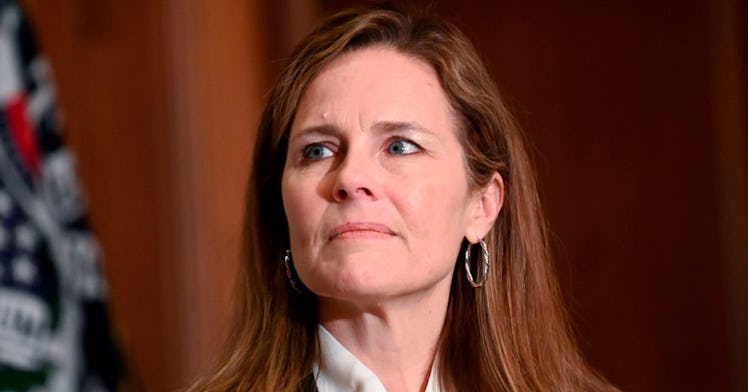What Is Charismatic Christianity? Amy Coney Barrett’s Religion, Explained
Supreme Court Justice Nominee Amy Coney Barrett is a Catholic who worships in the Charismatic community. But what does that mean?

Amy Coney Barrett is President Trump’s Supreme Court Nominee. In an attempt to tilt the court’s majority in favor of conservatives — before the election in less than 30 days — the Republican-led Senate begins confirmation hearings today to try to get Barrett on the court before the November election. Whether or not that’s fair, or even what the voters want, is another question altogether. The lawmakers determined to jam Barrett through the nomination process, are the same people who four refused to do something similar for President Obama’s nominee over 250 days before the end of his presidency.
But who is Amy Coney Barrett, and what are her fundamental beliefs? She’s a person who is in the Charismatic Christianity community, what does that mean? Will her religious background influence her decision-making on the court? The answer is likely yes, based on her public statements, and her judicial record.
What Is Charismatic Christianity?
Charismatic Christianity, which is otherwise known as Spirit-filled Christianity, is a belief system believed by several different denominations of Christianity including Pentecostalism, the overall Charismatic Movement, and the Neo-charismatic movement. Not every expression of Charismatic Christianity is the same, and for Barrett, who is a Catholic who is involved in the Charismatic community, it might look different than someone who is involved in, say, the Bethel Church in Redding, California, that teaches, among other things, that regular human beings can perform miracles like curing illness or physical ailments through the power of God. Charismatic Christianity is not a sect of Christianity that requires speaking in tongues to be evidence of the Baptism of Spirit Baptism. About 25% of the world’s Christians by the year 2011 were either Pentecostal or Charismatic Christians.
What Are The Beliefs of Charismatic Christianity?
Charismatic Christianity came around in the 1960s, when an Episcopalian church rector in Van Nuys, California by the name of Dennis Bennett, announced to his church that he felt the Holy Spirit within him. Some basic tenets or traits in Charismatic churches include a physical experience of religion.
But the group is huge. Since Barrett is not just a Charismatic Christian but also a Catholic, her belief system is likely a hybrid of both Charismatic Christianity and traditional Catholic teachings. Denominations in the grouping of Charismatic Christianity believe in miracles, signs, and wonders from God, in the possibility of supernatural experience through God, like prophecy, healing, and spiritual gifts. But these are just basic characteristics of the community and the belief system.
Charismatic Christianity has been a part of the Catholic religion since the late 1960s; Catholic charismatic renewal refers to a “current of grace” that incorporates both Catholic dogma and the Charismatic movement’s teachings. In the Catholic church, in practice, Charismatic Catholics often have church and prayer meetings outside of normal Mass that focus on prophecy, healing, and glossolalia (otherwise known as speaking in tongues). There’s a strong focus on a personal relationship with Jesus and a focus on him as a “living reality in the Spirit.” The last four Popes have ties to the Charismatic movement.
Will Her Religion Impact Her Court Rulings?
It’s possible. The only way to tell what Barrett’s rulings will be like is to look at her past judicial history, although much might be made of her religious background. For some people, their religion and their work have no relationship, for others, they are central to organizing their decisions. Some mainstream or well-known charismatic churches have been outspoken with their conservative views.